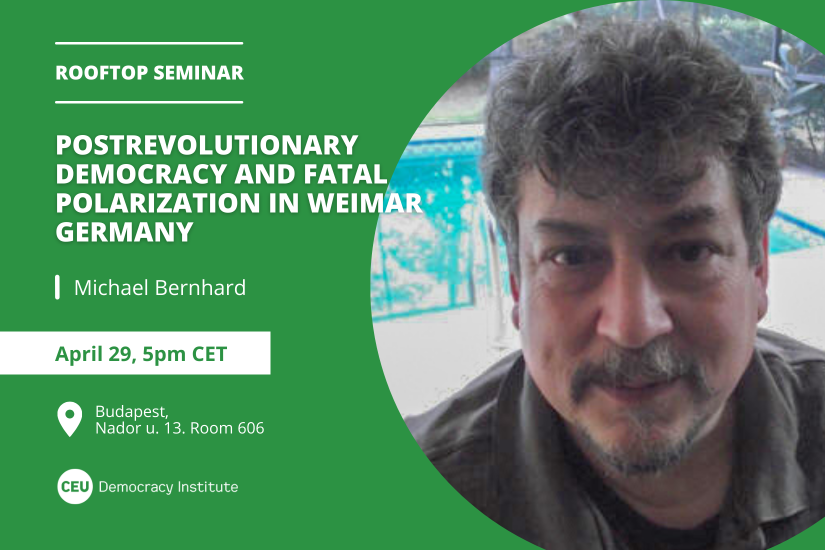
The De- and Re-Democratization (DRD) Workgroup of the CEU Democracy Institute cordially invites you to its next Rooftop Seminar. This is a joint event with the Democracy Institute's Democracy in History Workgroup.
You can check our past events here.
If you would like to attend, please register here.
Please keep in mind that external guests cannot enter the building without prior registration. Due to space restrictions, attendance is limited. We ask registered visitors to pick up their temporary visiting card at the reception. The event is not open to the press.
The paper is available upon request from the author.
Abstract:
We look at the impact of revolutionary activity during the collapse of the German Empire in 1918 and the German Revolution to understand voting for extreme parties in the post-1928 crisis elections in the Weimar Republic. We examine this expectation using strike data at the regional level during the revolution and gauging its impact distally using techniques of ecological inference estimation. Our expectation is that in areas where revolutionary strike activity was high, we will be able to pinpoint the identities more prone to extremist politicization. Further, we expect to see substantially less voting for the ideological extremes in predominantly Catholic regions, due to the cross-class denominational basis of the Center Party. Along the lines suggested by the existing literature we expect Nazi support to be stronger in Protestant areas and that occupational support will vary according to how economic conditions and revolutionary legacies contribute to dissatisfaction with democracy and polarization. We find that the legacy of contentious behavior during the German Revolution had an important impact on voting behavior across occupational groups. On the extreme left, for the Communists, we found that this impact was strongly class-based, inducing similar voting patterns in both Catholic and Protestant spaces. On the extreme right, for the Nazis, the effect was concentrated in Protestant localities with the legacies of the revolution far more varied, suggesting a more complex interplay between economic conditions and class identity shaping support. This is in line with idea of the Nazis as a popular protest party that brought together a coalition of groups with disparate grievances against Weimar democracy.
Speaker:
Michael Bernhard is the inaugural holder of the Raymond and Miriam Ehrlich Eminent Scholar Chair in Political Science at the University of Florida. His academic work centers on questions of democratization and development both globally and in the context of Europe. Among the issues that have figured prominently in his research agenda are the role of civil society in democratization, institutional choice in new democracies, the political economy of democratic survival, and the legacy of extreme forms of dictatorship. He recently finished up a stint as a co-PI on the research side of the Varieties of Democracy project and is responsible for its batteries on civil society and state sovereignty.
Discussant:
Balazs Trencsenyi is a Professor at the History Department of Central European University, and co-director of Pasts, Inc. Center for Historical Studies, and director of the History in the Public Sphere Erasmus Mundus MA Program (www.hipsma.com) at CEU. From 2021, he has been leading the Democracy in History Work Group at the DI. He is an elected member of Academia Europaea .His main field of interest is the history of modern political thought in East Central Europe. Between 2008 and 2013, he was Principal Investigator of the European Research Council project, “Negotiating Modernity”: History of Modern Political Thought in East Central Europe. He has held fellowships at Centre Marc Bloch, Berlin; Wissenschaftskolleg zu Berlin; Imre Kertész Kolleg, Jena; Centre for Advanced Study Sofia; IWM Vienna; and Collegium Budapest. He is currently working on a project of comparative history of crisis discourses in interwar Europe.
Chair:
Ágnes Katalin Kelemen is a research assistant at the CEU Democracy Institute. She holds a Ph.D. in History (2019) from Central European University, an MA in nationalism studies (2014) with a specialization in Jewish studies from Central European University and a BA (2012) in history and religious studies from Eötvös Loránd University. Her main research interests are East Central Europe, migration and Jewish history. Between her Ph.D. and joining the Democracy Institute (2019-2022), she worked as a research fellow at the Masaryk Institute of the Czech Academy of Sciences. She has published numerous peer reviewed academic articles and book chapters in Hungary, Italy and the Czech Republic, while also working on the public dissemination of historical knowledge.